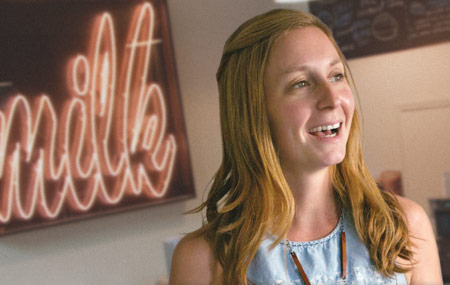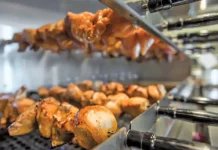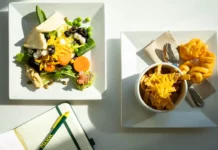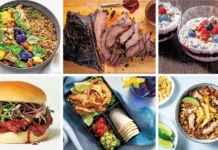
How did you start out in the food business?
My family’s from Ohio and food was a really big central part of our daily lives. You meet up around food; you cook food and bring it to other people. Food continued to be a really big part of our family life so I fell in love with food and feeding others at a very early age. My parents were first-generation college grads so it was important for their kids also to go to college. But halfway through college I realized I didn’t want a normal 9-5 job and as I was going to college studying for classes, I would stay up till the middle of the night, baking! I would do it on a daily basis. In college I’d bake three or four recipes every night and I realized as I was pushing myself to finish my college degree that I was really obsessed with it. So, I got a job as a hostess at a microbrewery (that was the only thing they’d hire me for!) and I fell in love with every single part of the industry.
Why do you think you were so attracted to this world?
The feeling when you walk into a bustling restaurant, the feeling of being part of a food-service team, whether in the front or the back of the house, I just became completely obsessed. I forced my way up the chain. I would serve at night and come in and be the prep cook during the day. I couldn’t get enough of it. My parents weren’t incredibly pleased at first. I went to college and graduated, but they were wary, “You have a college degree, why do you want to wait tables or work as a prep cook among a bunch of people who may not even have graduated from high school?” You can’t explain why you love something. But they could see the passion coming out of me. And they’ve come around.
How did you end up in New York?
I graduated from college a year early because I knew I couldn’t do anything until I graduated. In the summer a friend went to an island off the coast of New Hampshire, Star Island, and she got me the job as head baker running an entire bakery for the conference center, and doing that I realized I didn’t have the well-rounded skills I needed or wanted. So I went online and found the French Culinary Institute, now the International Culinary Center. I knew I wanted to go to culinary school, I wanted that type of formal education as well as hands-on expertise, and finding a culinary school in New York was the best way to go — school by day and get my hands dirty by night. Going to somewhere like the Culinary Institute of America, where you’re a student the entire time didn’t work for me. I knew I needed to be in the epicenter and I’m also really competitive. This is the most competitive place and I can ‘cannonball’ in.
How did your career blossom?
I would go to school during the day and at night I needed a restaurant job but the only restaurant job I ever had was in Virginia, where my family moved after my dad got a job with the Department of Agriculture. I just dropped my resume off everywhere, and one restaurant hired me, Aquagrill, they hired me as a reservationist. I worked my way up to maître’d and the team there knew I was going to culinary school and one had a connection at Bouley. He told them, this girl really wants to do pastry but no one will let her in. It was 4-star dining, and he said, ‘I called my friend, and the pastry chef is waiting for you.’ So I went down one day after school and met Alex Grunert, the pastry chef, and he was one of the most amazing people in the world, so talented, so patient. He’d, run it in such a way you have to be hungry; you have to push yourself as much as he pushes you. I started there 2 ½ years, and just blossomed. It’s like working any profession. You have to get into it, you have to really get your chops there and for me Bouley was that, and under the direction of Alex, that’s what I got.
Where did you go from there?
I realized what I really needed was a place to refine my technique a bit more. I was curious about the technique of food and experimenting with food and had always been really, really intrigued by wd-50. I knew that I didn’t have much to bring to the table, because it doesn’t plug into the same clientele as Bouley. But I walked down there one day and said hey, I just finished at Bouley, can I come and stage for you? They told me there was no job opening, but they said, sure, you can come as many days as you want. You have to decide what you’re going to put in and get out so I staged there for about a year until one of the pastry cooks left and they offered me the job. While I was working there, I had to find jobs to pay my rent, so I worked as an editorial assistant and in catering and food styling for friends who had their own established businesses. I actually found them on Craigslist. I would take any old food-related job and make friends, because I was still trying to figure out what I wanted. I worked at Per Se in the front of the house. I just liked being a part of it. I knew I wanted skills from wd-50 but I also knew it was not a paying job. In the end, in a really lovely way, I was able to round myself out, the back of the house, the nuances of experiencing the food industry.

Did you learn anything special at wd-50 as you were honing your skills?
It’s a small team. Once you become a pro in this space, you have to find ways to push yourself so I asked Wylie Dufresne, when my weekend comes up, are there any projects I can help out on? One was writing a hazard analysis plan for the health department, how to use a Reduced Oxygen Packaging (ROP) machine. I basically figured out how to write a HACCP plan and contacted the health department and got that rolling for Wylie. At the same time, Dave had opened Momofuku Noodle Bar and he and Wylie were friends. Wylie said, my friend Dave is having the same problem; can you help him on your next day off? So I met Dave and wrote a HACCP plan for him. I liked what Dave was doing. He didn’t serve dessert, but I loved the operation of it, his spirit, his team, that he had a refined technique and experience in the food space that he was delivering in a really casual way that people were responding to and that hooked me into it. I helped him do everything from HR to operations to management and I would bake at night at home and bring it in and he knew what my background was. He said, you have to start making desserts for a restaurant, this is a waste of your time, your love is in desserts.
That evolved over time to dessert menus at the restaurants and part of Ssäm Bar was a laundromat. That space became available and the only concept we had was a bakery so I opened Milk Bar, and that’s how it all began.
As you opened your own place, what was different? Or was it natural and fell into place?
By nature of how it came to be, so naturally, the day-to-day uphill battles of not knowing if we’d be busy or slow, that was scary in the beginning. But from the start we were very busy and we had to figure it out in the moment. OK, we’re going to sell three times what we thought we would, how are we going to do that? From staff to training to the flow of service, all of those things that you have to really love and think are fun and exciting and amazing to be in this industry, I loved it.
How did it occur to you that you had to start your own business?
It was one actually of those moments where I realized I had actually been training for it this entire time; I had the skill set to do it. I had always been student government leader and president of all the clubs in high school and college and it all came into place. I realized I had all the muscles I needed to flex to make it happen. In a funny way, if I had planned for it, I would have gotten into my own head, considered too many things. I learned to just push myself off the ledge and jumped and realized I was really suited for it.
You’ve been able to create local bakery successes in wide range of locations. How have you done that?
Part of it is a testament to what’s happened over the last 5-8 years, in terms of the nation’s enthusiasm for food. That’s been a big part of it, that enthusiasm that feeds the media machine, its ability to find and highlight really fun and interesting food concepts, has been really big for us. I’m a mover and a shaker. If someone talks about us on The Today Show or Regis and Kelly—one guest said she loved our crack pie and the next day we had 600 requests for crack pie®. I knew I wanted to develop a shipping or an ecommerce business but I was nowhere near ready. I spent the next three days, no sleep, figuring it out. It’s a little bit of an equation of multiple variables — people’s enthusiasm and curiosity in food, what the media has done in highlighting what’s special and being able to understand your customers and that your customer base wants to grow and expand and just be there for them.
You have an interesting idea about how baked goods can shape a life.
It’s probably the most fun, delightful thing you can possibly bring to someone. You can’t ship pork buns to Kansas but you can ship a birthday cake, a chocolate malt layer cake. That’s been the really fun part of being able to have a customer base, a Milk Bar community across the U.S.
What is a Milk Bar community?
For me, it’s a vast group of people who understand, who grasp the concept of food bringing delight and happiness, and understanding the concept of celebrating the everyday ordinary. That’s what a baked good is, celebrating that everyday ordinary. It’s a very giving community. You bake to share with people and people that love the Milk Bar brand love that. It’s a joyful place in New York City. It’s a little bit of a scene. It’s really accessible, it’s fun, it’s playful, it’s for anyone and everyone. From a price point, entry is very, very low. We open the doors, from 8 a.m. to midnight. It’s a great community of sharing. It’s not a Starbucks, we don’t have tables where you can camp out with your latte and write a novel. It’s a bustling environment, created purposely in that way. It’s a loud, fun, vibrant place.
What makes operating and succeeding in Manhattan different?
Each market is different. Even if we think we have it all down in New York City, I love that uphill attitude. It will be a different game in D.C. I like that challenge. In New York it’s about understanding the variable of real estate prices meeting the concept meeting the customer base. Toronto is very different. There are similar variables but the weights are different. In New York City, it feels like things are equal parts. In Toronto it’s much more about location, not about how you pay the rent, though that’s a business reality, of course. It’s about customers in Toronto. They’re a different customer base; they want to know they have something that’s different, special, new. They want something they can participate in. They have different expectations. D.C. feels like homecoming to me. As much as I know about the area and think about myself as a consumer, it’s still very different – a very political customer base. It’s a really thrilling thing. You try to consider as many variables as you can, but you know, the minute you open your doors, anything can happen. You have to see how your customers interact with your brand and understand your brand. I like that game, cat-and-mouse. That’s been my career, continually reinventing myself.
This brand that you’re building, is it Christina Tosi or Milk Bar?
For Milk Bar, it’s more about building the brand of Milk Bar. For me it’s about community, not about an individual. The hardest part of being a chef and owner is that people yearn for a name, a face, to connect with, and it helps them simplify and understand the process. For me, it’s a community, a team that makes it happen. I don’t make and create every single thing on the menu. It’s certainly my vision, I started it, and nothing goes out the door without me being part of the process. But it exists because it’s a community and as a customer base, it’s thrilling to be a customer and to love and be part of the brand because it feels like a community. For me it’s more about building out that mind set. At the same time, you can’t have a bunch of no-name, no-face people talking about the brand. That’s where I come in. I personally am a big proponent of what I like to participate in, whether it’s non-profit or being a female entrepreneur or a boss. Giving back to the industry is really important. That’s how I got to where I am. I’m in the middle of understanding how the two fit into one another.

What role does the book play in building these brands and how does that relate to being on TV?
The book plays into it all. Milk Bar Life is sweet and savory recipes that we love to make and bake, at least, when we’re on or off the clock at Milk Bar. None of the recipes help you walk into one of the bakeries and buy. The book celebrates embracing the spirit of how you feel when you’re eating a compost cookie® and why you have this deep connection to cereal milk™! It’s about the recipes but it’s also about the approach to it, the mentality behind getting a little goofy or being a little quirky and embracing really the simple, humble things in life. We’re talking about cookies, cakes and pies. Those are the most simple and greatest delights that we have in the baked goods world. Milk Bar Life is about celebrating the feeling of that and where it comes from and how we come up with it and why we come up with it. It’s about celebrating why you love Milk Bar, why you love the spirit of Milk Bar. As much as it’s a bakery and a recipe, it’s a way of life, a lifestyle.
What do you want people to get from the book, and TV?
For me, the book is a recipe book, or a story book if you never get into the kitchen. It brings you a smile and a lightness in life. It’s a picture book — if you don’t want to read, just turn the pages and giggle and understand the beauty and simplicity of being lighthearted, with an optimistic spin on life.
With TV, it’s a different beast. It’s harder to translate that. When we do Late Night with Seth Meyers, or go on Conan, you get more of an opportunity to jump around and smile and make something fun and have a good time. On Master Chef, it’s harder because it’s more about time spent in the kitchen. I think that’s the interesting juxtaposition behind running a bakery and being a chef mentor to amateur home cooks.
What role does community involvement in charities have for you?
They’re huge for me. I was raised by these women who love to bake. You bake to bring something to someone at the hospital or bring over when someone’s lost a loved one. That power, that missionary spirit, is something that I only ever have known. Giving back, that sort of selflessness of it, is just part of my make-up. It’s what I know and the only way I want to spend my free time is making people happy or giving other people support.
What role does the vendor community play in your ability to execute what you accomplish every day? How do you source what you need?
It’s huge. As a small business owner, in theory, it’s a lot easier if you only have to write one check to one distributor! But that’s not the reality of creating clever, interesting food. The relationships that we have with our distributors are hugely important. We are constantly developing new recipes so our ability to form relationships with different vendors is mandatory in terms of knowing what’s out there and in terms of saying, “hey we need to find this, can you help us?” Whether it’s a vehicle for one of our bakeries or an ingredient, and as food and dietary trends change, our reliance on great vendors is huge. We wouldn’t be able to do what we do without it. We train our staff to be polite, pay our bills ahead of time. Knowing what a bad relationship with a vendor does, doing the absolute opposite is a core competency!
What about equipment?
The equipment list in our kitchen is short. We live and die by our Hobart mixers. There are a lot of commercial mixers out there, but they are like tanks. They never stop mixing. They’re surrounded by a sea of stainless steel tables. We bake all our cookies in electric Alto Shaam combi ovens. They are the most accurate, in terms of consistency. We have tried out so many types of ovens and the one thing I’ve found to be a bakery that produces great products, you need great bakers. You can’t just set it and forget it. You need someone, it’s still a hands-on art and those combi ovens give us just the right amount of automation but the right stopping point of that human element– is it really baked, or did the timer just go off and does it need another 30 seconds? We use combi function to make our bagel bombs. We also have a huge Hobart dishwasher to do the dirty work. We also have an enrober and packaging machine, new additions that are really exciting. But that’s kind of what we’ve got.
What does the future hold?
In general, a continuing of a deepening of the brand in the community and for us continuing to understand who we are as we evolve, finding deeper, more meaningful ways to connect with our customer base, whether through the store, or the cookbook or through TV, by making the right decisions that represent us and celebrate us and celebrate the people who love us and our customers. Not saying yes to everything, means we’ll continue to make it a really exciting brand.
























Comments are closed.